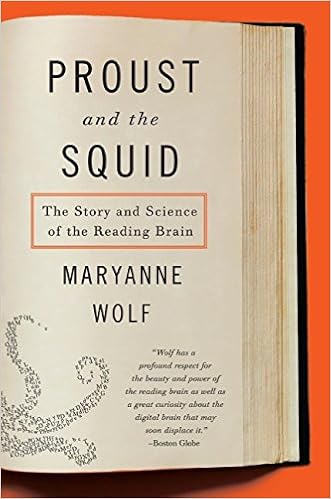This engaging read is about reading the brain. The book is split into three parts. The first covers the history of reading and discusses human creation of pictographs and then the alphabet. The second part covers how children learn to read. And the third part covers dyslexia and various reading dysfunctions.
The history section was probably the most fascinating to me. The author discusses how reading is an unnatural (i.e., nongenetic) activity and thus how it changed the actual structure of how minds work. Different language systems, it turns out, use different parts of the brain. An example of how this is evidenced is the case of a man who had a stroke leaving one side of his body was paralyzed. He lost the ability to read Chinese (which uses both sides of the brains), but he retained the ability to read English (which uses only one).
As for reading being unnature, the book goes into how the brain has to adapt--learning to connect visual portions to linguistic portions of the brain. (I suppose it would be akin to learning braille, and having to connect touch to linguistics.) Some folks can't do it, which is how you end up with some learning disabilities. There are many reasons for this, but sometimes parts of the brain simply don't work in some folks. The author goes into some interesting stories about stroke victims, like the one above or another about a man who had a stroke and then had trouble reading afterward even though he could still see and speak (the synapses connecting the two portions of the brain that do each of those had been severed).
My only complaints come with the third section, which I found at times much harder to follow. The author, being an expert on reading disabilities, became a bit technical here. Sometimes, when you're really within your field, it's hard to pull back and write down to people. Still, this book, even in its more difficult passages, was easier reading than the neuroscience textbook I've been reading for RB&D, though both books are fascinating. I should have been a brain surgeon, except I'd have had to have studied all that other biology, which I typically am bored by.
Saturday, March 7, 2009
On "Proust and the Squid" by Maryanne Wolf ***
Labels:
Books,
Maryanne Wolf,
Nonfiction,
Three-Star Nonfiction
Subscribe to:
Post Comments (Atom)







No comments:
Post a Comment